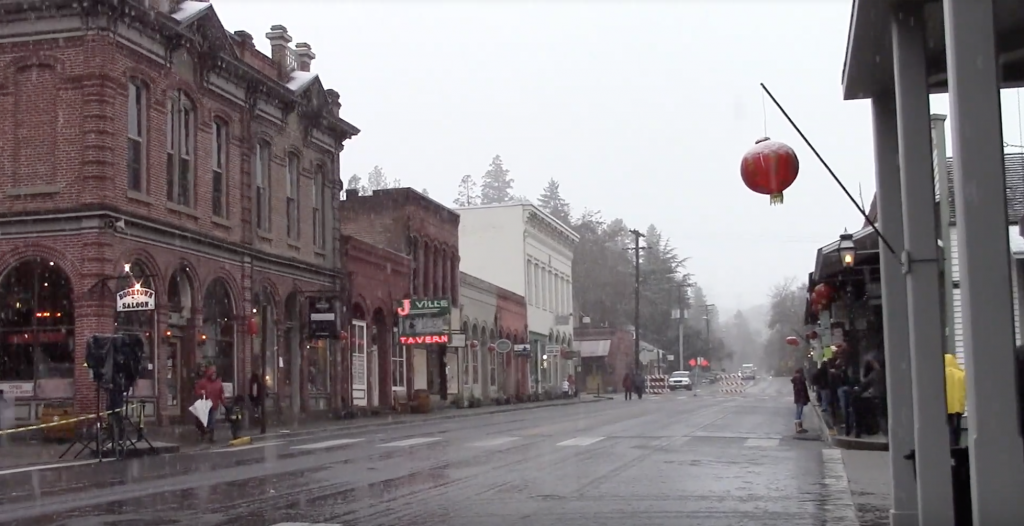Southern Oregon’s rich history of Chinese immigration extends back to the beginning of the Oregon Gold Rush in the 1850s. To commemorate this history, the town of Jacksonville, Ore., working with Southern Oregon Chinese Cultural Association puts on a yearly Chinese New Year’s Celebration.
Dr. Chelsea Rose is an archaeologist based at Southern Oregon University Laboratory of Anthropology (SOULA) who works on Chinese cultural heritage sites in California and Oregon and currently works on the Oregon Chinese Diaspora Project in Jacksonville. The following is a transcript of an interview with Rose.
Video by Keegan Van Hook
How long have Chinese diasporas existed in Southern Oregon?
Chinese miners started immigrating to Oregon shortly after gold was first discovered in the winter of 1851 and ‘52. At different times, the population of Chinese immigrants in Jackson Co. was sizable. It was once quite a large percentage of the overall population, and many Chinese immigrants stayed here well into the early 20th Century, but there are no longer diaspora communities directly descended from these populations of miners. I have yet to meet anybody locally that is a descendent of those early Chinese immigrants that lived in Southern Oregon.
So they came for the opportunity of gold. What were their lives and customs like, and what was their local impact?
Chinese immigrants to Southern Oregon lived very similarly to a lot of immigrants in the 1850s, 1860s. They lived in communities with folks who shared their language and cultural traditions, but they also did quite a bit of adapting to their new home and the settler culture around them. From a purely artifact, material culture perspective, there lives are a lot similar to the Swiss immigrants at the Peter Britt site neighboring where the Chinese diaspora was settled. They did maintain to some of their traditions.
The annual Chinese New Year Celebration is an important way the Chinese community in Jacksonville has always shared its culture with the larger community. That first Chinese population did bring over a lot of traditional foods, too, which created a lot of markets. Euro-american and Chinese merchants could import stuff from Hong Kong or Canton through ports like San Francisco or Portland, and it would make its way even to the most remote outposts in Southern Oregon.
Chinese immigrants, overtime, faced a lot of discrimination and made more effort to fit in. There were anti-chinese laws were made on the local, state and federal levels, and many existed pretty much from the time immigrants first started arriving. The earliest of these laws in Southern Oregon were mining camp laws that prohibited Chinese miners from seeking claims. Other laws were state-level which would prohibit Chinese from owning land and getting married–those kind of things. What happened is that all those factors got in the way of Chinese immigrants really putting down roots in here and establishing long-term presences and communities just like the ones of immigrants from other places.
How long has the Annual Southern Oregon Chinese New Year Celebration existed, and what importance has it played to Chinese diaspora community and the local population at large?
Local newspaper articles go way back talking about the Annual Chinese New Year’s Celebration, and it probably was constant for over fifty years in Jacksonville in its early days. Even when the Chinese community was pretty small, newspapers show the importance of this event. That says that it became an important event for the larger community as well–not just for the Chinese residents. It is exciting that the Southern Oregon Chinese Cultural Association (SOCCA) has brought this event back over the last decade because it has always been a really important part of Jacksonville, I think.
What is the local impact of the Chinese New Year’s Celebration?
Local newspaper articles go way back talking about the Annual Chinese New Year’s Celebration, and it probably was constant for over fifty years in Jacksonville in its early days, even when the Chinese community was pretty small. That says that it became an important event for the larger community as well–not just for the Chinese residents.
The event also helped local industries. There were many pork ranchers who made a lot of money raising extra pigs to sell during Chinese New Year’s. The celebration had an economic impact on the local region, so it is exciting that the Southern Oregon Chinese Cultural Association (SOCCA) has brought this event back over the last decade because it has always been a really important part of Jacksonville.
So there is not longer left anyone descendant from the original Chinese immigrants. Why did these first immigrants and their families leave?
Chinese immigrants started to leave or stopped coming for two primary reasons. Eventually gold strikes in the Rogue Valley started to wain, and opportunity was popping up elsewhere with gold strikes in John Day and Grant Counties about a decade after the first strikes. So that drew many of the immigrants away for new opportunities, but the bigger reasons why Southern Oregon did not retain a Chinese diaspora descended from the first immigrants is due to the various anti-Chinese laws in the 1800s and 1900s..
Where did the first Chinese immigrants go after Southern Oregon?
A lot of them ended up in Portland or San Francisco. Some people know that their ancestor worked on the railroads or worked in the mines somewhere, but not everybody knows where specifically those family (ancestors) were, so it is hard to tell whether someone has confirmable ties to Jacksonville’s early Chinese populations. Some people also went back to China, as they had families over there



